Transform Your Outdoors: Landscape Gardening in Barnes
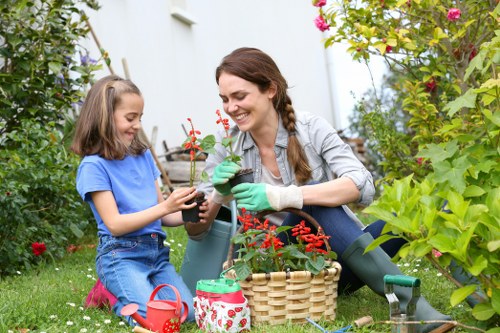
Landscape gardening in Barnes offers a unique opportunity to create a personalized outdoor space that combines beauty, functionality, and sustainability. Whether you’re a seasoned gardener or a beginner, understanding the local climate, soil conditions, and plant varieties is essential to achieve a stunning garden.
Barnes, a picturesque area known for its lush greenery and charming residences, provides the perfect backdrop for various landscaping projects. From designing vibrant flower beds to installing elegant patios, the possibilities are endless. In this guide, we will explore the key elements of landscape gardening in Barnes, ensuring your garden becomes the envy of the neighborhood.
Planning is the first step in any successful landscape gardening project. Start by assessing your outdoor space, considering factors such as sunlight exposure, soil quality, and existing structures. Create a layout that incorporates different garden zones, such as relaxation areas, play zones for children, and spaces for outdoor dining.
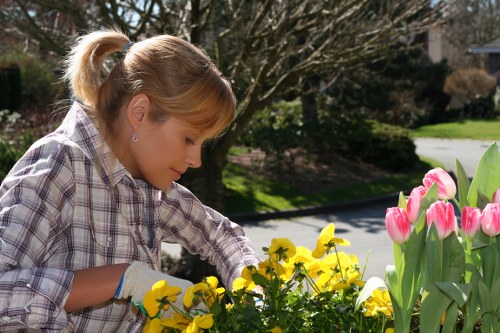
Understanding the Barnes Climate and Soil
One of the critical aspects of landscape gardening in Barnes is understanding the local climate and soil conditions. Barnes typically experiences a temperate climate with mild winters and warm summers, which influences the types of plants that will thrive in your garden.
The soil in Barnes is predominantly clay-based, which retains moisture well but can become compacted. To improve soil health, consider adding organic matter such as compost or well-rotted manure. This not only enhances soil texture but also provides essential nutrients for plant growth.
Monitoring and adjusting the pH level of your soil can also make a significant difference. Most garden plants prefer a slightly acidic to neutral pH. Conduct a soil test to determine its acidity and make necessary amendments to create an optimal growing environment.
Choosing the Right Plants for Barnes Gardens
Selecting plants that are well-suited to the Barton climate and soil is crucial for a thriving garden. Native plants are an excellent choice as they are adapted to the local conditions and require less maintenance.
- **Annuals**: Perfect for adding seasonal color, annuals like petunias and marigolds bloom throughout the growing season.
- **Perennials**: These plants return year after year, providing long-lasting beauty. Consider peonies, lavender, and hostas.
- **Shrubs and Trees**: Incorporate a mix of evergreen and deciduous shrubs to maintain structure and interest year-round.
Incorporating a variety of plant types ensures a dynamic and visually appealing landscape that changes with the seasons.
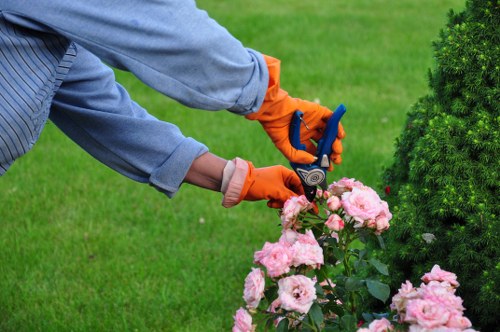
Designing Functional and Aesthetic Spaces
A well-designed garden balances aesthetic appeal with functional spaces. Start by defining clear areas for specific activities, such as a seating area, a play area for children, or a vegetable garden.
Use pathways and borders to guide movement through your garden. Materials like gravel, stone, or gravel can add texture and structure. Consider adding a water feature, such as a fountain or pond, to create a focal point and enhance the tranquil ambiance.
Patios and Decks are essential elements for outdoor entertaining. Choose materials that complement your home’s exterior, and ensure there is adequate seating and shade. Pergolas or umbrellas can provide relief from the sun while adding architectural interest to your garden.
Incorporating Sustainable Practices
Sustainability is increasingly important in landscape gardening. Implementing eco-friendly practices not only benefits the environment but can also reduce maintenance costs.
- **Rainwater Harvesting**: Install rain barrels to collect and reuse rainwater for irrigation.
- **Composting**: Create a compost bin to recycle garden waste and enrich your soil naturally.
- **Native Planting**: As mentioned earlier, native plants require less water and are more resistant to local pests.
By adopting these sustainable practices, you contribute to a healthier ecosystem and a more resilient garden.
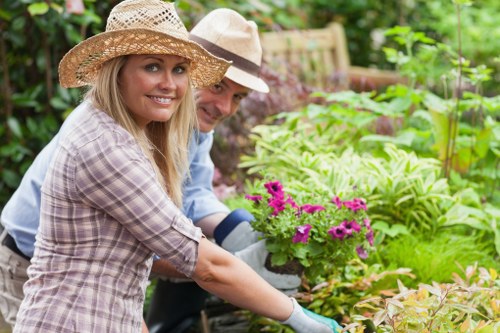
Seasonal Care and Maintenance
Maintaining a beautiful garden requires regular care and attention. Each season presents its own set of tasks to ensure your landscape remains vibrant and healthy.
**Spring** is the time for planting new flowers, pruning shrubs, and preparing garden beds. Remove any winter debris and apply mulch to conserve moisture and suppress weeds.
In **Summer**, focus on watering, weeding, and monitoring for pests. Deadheading spent blooms encourages new growth and prolongs the flowering period.
Autumn and Winter Maintenance
During **Autumn**, clean up fallen leaves and plant bulbs for spring blooms. It's also an ideal time to prune trees and shrubs to promote strong growth in the coming year.
**Winter** care involves protecting sensitive plants from frost and snow. Install frost covers or move potted plants indoors to prevent damage. Use this time to plan and design next year’s garden projects.
- **Regular Watering**: Ensure plants receive adequate water, especially during dry spells.
- **Mulching**: Retain soil moisture and regulate temperature.
- **Pruning**: Maintain plant health and shape.
Consistent maintenance throughout the year is key to a thriving landscape garden in Barnes.
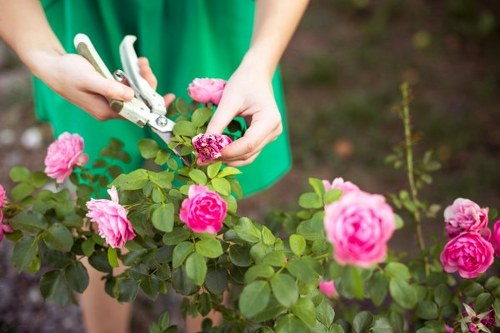
Enhancing Your Garden with Accessories
Adding accessories can elevate the beauty and functionality of your landscape garden. Consider the following elements to enhance your outdoor space:
- **Lighting**: Illuminate pathways, highlight focal points, and create ambiance with strategically placed garden lights.
- **Furniture**: Comfortable seating areas encourage relaxation and enjoyment of your garden.
- **Decorative Elements**: Incorporate sculptures, birdbaths, or garden art to add personality and charm.
- **Irrigation Systems**: Automated watering systems ensure your plants receive consistent hydration with minimal effort.
These accessories not only improve the aesthetics of your garden but also increase its functionality and comfort.
Creating Privacy and Boundaries
Privacy is an important consideration in landscape gardening, especially in areas with closely spaced homes. Use fences, hedges, or trellises to create secluded spaces within your garden. Evergreen plants like boxwood or privet provide year-round coverage, while flowering climbers add beauty and interest.
Strategically placed boundaries define different sections of your garden and prevent the spread of plants into unwanted areas. This helps maintain order and enhances the overall design.
Final Thoughts on Landscape Gardening in Barnes
Landscape gardening in Barnes is a rewarding endeavor that transforms your outdoor space into a personal sanctuary. By understanding the local climate and soil, selecting appropriate plants, designing functional and aesthetic areas, implementing sustainable practices, and maintaining your garden through the seasons, you can create a beautiful and enduring landscape.
Start your gardening journey today and enjoy the numerous benefits of a well-designed garden, from increased property value to enhanced well-being and relaxation.
Ready to transform your garden? Contact us today to start your landscape gardening project in Barnes!